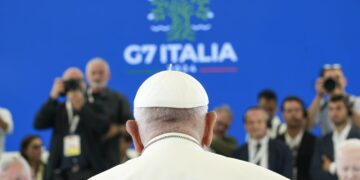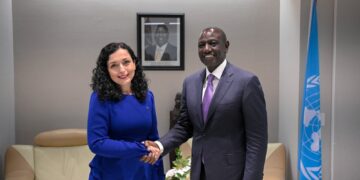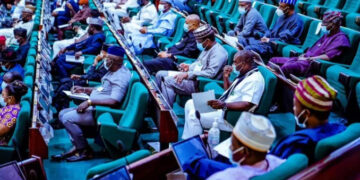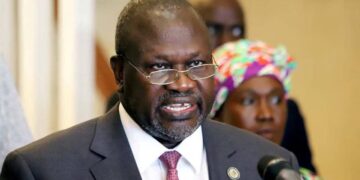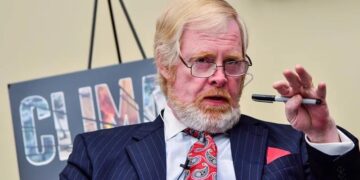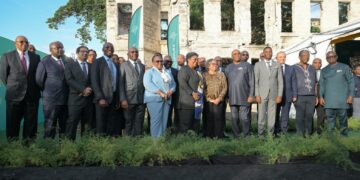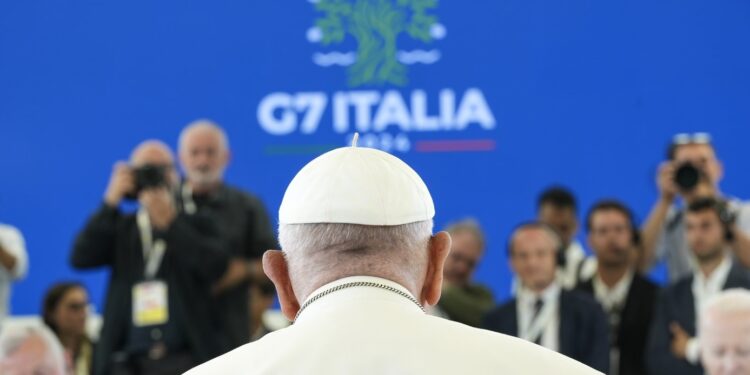By John Ikani
Pope Francis made history Friday as the first pontiff to address the Group of Seven ( G7) meeting in Fasano, Italy, where he expressed concerns about artificial intelligence.
He warned that such powerful technology could reduce human relationships to mere algorithms.
Invited by host Italy, Francis brought his moral authority to the Group of Seven, addressing a special session at their annual summit on the dangers and opportunities of AI.
This marked the first time a pope attended the G7, providing an ethical perspective on an issue that is increasingly significant in international summits, government policies, and corporate strategies.
Francis emphasized that politicians must ensure AI remains human-centric, so decisions regarding the use of weapons or other tools always remain in human hands, not those of machines.
“We would condemn humanity to a future without hope if we took away people’s ability to make decisions about themselves and their lives, by dooming them to depend on the choices of machines,” he said.
“We need to ensure and safeguard a space for proper human control over the choices made by artificial intelligence programs: Human dignity itself depends on it.”
Francis joins a growing number of countries and global organizations advocating for stronger regulations on AI following the surge in generative artificial intelligence sparked by OpenAI’s ChatGPT chatbot.
The Argentine pope used his annual peace message this year to call for an international treaty to ensure AI is developed and used ethically.
He argued that technology lacking human values such as compassion, mercy, morality, and forgiveness is too dangerous to be developed unchecked.
The Pope didn’t reiterate that call explicitly in his Friday speech, but he stressed the responsibility of politicians to lead on this issue.
He urged them to ultimately ban lethal autonomous weapons, often referred to as “killer robots.”
“No machine should ever choose to take the life of a human being,” he said.
Addressing the leaders present, he concluded: “It is up to everyone to make good use of [AI] but the onus is on politics to create the conditions for such good use to be possible and fruitful.”
Italian Premier Giorgia Meloni invited Francis, aware of the potential impact of his moral authority on the G7. The attendees appeared deeply impressed, and the room fell silent when Francis arrived.
“The pope is, well, a very special kind of a celebrity,” said John Kirton, a political scientist at the University of Toronto who directs the G7 Research Group think tank.
Kirton recalled the last summit with similar star power was in 2005 in Gleneagles, Scotland, where world leaders decided to cancel $40 billion in debt for 18 of the world’s poorest countries to the World Bank and the International Monetary Fund.
That summit was preceded by a Live 8 concert in London featuring Sting, The Who, and a reformed Pink Floyd, which drew over a million people in solidarity against hunger and poverty in Africa.
“Gleneagles actually hit a home run and for some it’s one of the most successful summits,” Kirton said.
No such popular pressure is present at the G7 meeting in Puglia, but Francis knew he could use his moral authority to push for AI safeguards and highlight the threats to peace and society if human ethics are ignored.
“To speak of technology is to speak of what it means to be human and thus of our singular status as beings who possess both freedom and responsibility,” he said. “This means speaking about ethics.”
Generative AI technology has amazed the world with its ability to produce humanlike responses, but it has also raised fears about AI safety and prompted global efforts to control it.
Some fear catastrophic but distant risks to humanity due to its potential for creating new bioweapons and enhancing disinformation.
Others worry about its impact on daily life, through algorithmic bias leading to discrimination or AI systems that eliminate jobs.
In his peace message, Francis echoed these concerns and highlighted additional ones. He stated AI must prioritize fundamental human rights, promote peace, and guard against disinformation, discrimination, and distortion.
On the regulation front, Francis will be addressing leaders already active in AI oversight. The G7 members have been leading the debate on AI regulation.
Japan, last year’s G7 president, launched the Hiroshima AI process to create international guiding principles and a code of conduct for AI developers.
Prime Minister Fumio Kishida recently unveiled a framework for global regulation of generative AI, which can quickly produce new text, images, video, and audio based on prompts.
The European Union was among the first to introduce comprehensive AI legislation, set to take effect in the next two years and potentially serve as a global model.
The act targets any AI product or service offered within the bloc’s 27 nations, with restrictions based on the risk they pose.
In the United States, President Joe Biden issued an executive order on AI safeguards and called for legislation to strengthen them, while some states like California and Colorado have attempted to pass their own AI bills with mixed results.
Antitrust authorities on both sides of the Atlantic are scrutinizing major AI companies such as Microsoft, Amazon, and OpenAI to determine if their dominant positions stifle competition.
Britain initiated a global dialogue on managing AI’s extreme risks with a summit last fall. At a follow-up meeting in Seoul, companies pledged to develop the technology safely.
France will host another meeting in the series early next year. The United Nations has also adopted its first resolution on AI.
Alongside his AI speech, Francis has a full schedule of bilateral meetings. He met with Ukrainian President Volodymyr Zelenskyy and leaders from Algeria, Brazil, India, Kenya, and Turkey.
He will also meet with G7 members, including Biden, Canadian Prime Minister Justin Trudeau, and French President Emmanuel Macron.
